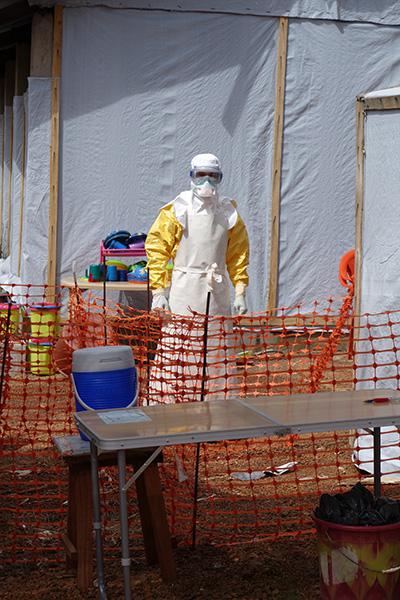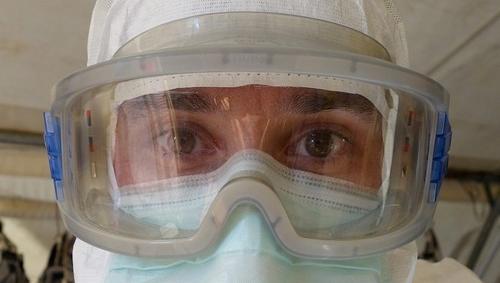This doctor is battling on the frontlines of the ebola crisis in Guinea
Dr. William Fischer wearing protective goggles.
Before Dr. William Fischer begins treating ebola patients in an isolation unit in a rural village in Guinea he has to put on a bit of gear.
"On top of the scrubs and thick rubber boots we wore an impermeable Tyvek suit which basically covered up every inch of our skin except for our hands and our head. We wore two layers of rubber gloves over our hands. Then we had an impermeable hood that went on top of the Tyvek suit, to cover our head. We wore a respirator over our mouth and nose. And then a pair of heavy duty goggles on top of the hood. So that literally not an inch of skin was exposed."
Here is an excerpt from Dr. Fischer's online journal written on June 8, 2014.
As the reality of my departure nears I can’t help but feel some sense of guilt—guilt for not having done more, faster, and better. But I think this feeling emanates from the fact that I can leave and the patients in this epidemic can’t. Last night we admitted a young boy who was transported with his mother from Kueldou. They had been locked in a house for four days because they were symptomatic. Unfortunately the delay in presentation was significant as only the boy was admitted because his mother died in transit. A 9-year-old boy sat next to his mother as she died. Now he sits in the isolation ward alone.
 His father and brothers walked the 25km today to the isolation ward as the family’s village has rejected them and reported that the father may have symptoms. The MSF team sent a car to pick them up but the father refused to ride given what happened to his wife.
His father and brothers walked the 25km today to the isolation ward as the family’s village has rejected them and reported that the father may have symptoms. The MSF team sent a car to pick them up but the father refused to ride given what happened to his wife.
Fortunately, the 3 other siblings do not have symptoms but I’m concerned it’s only a matter of time as the father walked 25km with one of the children tied to his back exposing him to potentially infectious sweat. The estimated 21-day incubation period of Ebola complicates contact tracing given that people can theoretically be symptom free for 3 weeks following exposure. Since we can’t hold the family in the isolation ward for 3 weeks we can only test them now and formulate plans to follow them in case they do develop symptoms.
When the 9-year-old was brought into the treatment facility he barely had a palpable pulse. When I met him he was weak, in pain, but incredibly stoic and most awfully alone. With fluid resuscitation we were able to get a pressure and with that a chance. His clothes were soiled and so we brought a new outfit for him. After some effort I got him to smile and in that smile I found false hope.
With Ebola you can’t have a good death. You are isolated from your friends, your family, your home. You are cared for by people whose primary focus is on stopping transmission from infected to susceptible and from patient to provider rather than comfort and cure.
These people often die without the comfort of a human hand, without seeing someone's full face or even just knowing that a loved one is near. I think of all the death notes that I’ve written in the United States and the bulk of them usually include the sentence, “they passed away peacefully with family at the bedside.”
I didn’t get a chance to write that for this little boy. Despite the hope that his smile brought me, he died overnight. In the void of darkness he converted to hemorrhagic shock with massive vomiting of blood and I’m told he bled out on the floor of the isolation ward.
I can’t help but think about what his last days were like – being locked in a house with his mother by his family and his community out of fear; then watching his mother die in the back of a pick up truck, being placed in an isolation zone staffed by foreigners in space suits, and finally vomiting blood alone.
I am troubled that I’m not better at this – that I haven’t figured out a way to implement more advanced healthcare infrastructure that would allow us to save more. When this epidemic is over I am sure there will be more time for reflection but now there are more patients and more chances to help.
Miss and love y’all
Billy
Before Dr. William Fischer begins treating ebola patients in an isolation unit in a rural village in Guinea he has to put on a bit of gear.
"On top of the scrubs and thick rubber boots we wore an impermeable Tyvek suit which basically covered up every inch of our skin except for our hands and our head. We wore two layers of rubber gloves over our hands. Then we had an impermeable hood that went on top of the Tyvek suit, to cover our head. We wore a respirator over our mouth and nose. And then a pair of heavy duty goggles on top of the hood. So that literally not an inch of skin was exposed."
Here is an excerpt from Dr. Fischer's online journal written on June 8, 2014.
As the reality of my departure nears I can’t help but feel some sense of guilt—guilt for not having done more, faster, and better. But I think this feeling emanates from the fact that I can leave and the patients in this epidemic can’t. Last night we admitted a young boy who was transported with his mother from Kueldou. They had been locked in a house for four days because they were symptomatic. Unfortunately the delay in presentation was significant as only the boy was admitted because his mother died in transit. A 9-year-old boy sat next to his mother as she died. Now he sits in the isolation ward alone.
 His father and brothers walked the 25km today to the isolation ward as the family’s village has rejected them and reported that the father may have symptoms. The MSF team sent a car to pick them up but the father refused to ride given what happened to his wife.
His father and brothers walked the 25km today to the isolation ward as the family’s village has rejected them and reported that the father may have symptoms. The MSF team sent a car to pick them up but the father refused to ride given what happened to his wife.
Fortunately, the 3 other siblings do not have symptoms but I’m concerned it’s only a matter of time as the father walked 25km with one of the children tied to his back exposing him to potentially infectious sweat. The estimated 21-day incubation period of Ebola complicates contact tracing given that people can theoretically be symptom free for 3 weeks following exposure. Since we can’t hold the family in the isolation ward for 3 weeks we can only test them now and formulate plans to follow them in case they do develop symptoms.
When the 9-year-old was brought into the treatment facility he barely had a palpable pulse. When I met him he was weak, in pain, but incredibly stoic and most awfully alone. With fluid resuscitation we were able to get a pressure and with that a chance. His clothes were soiled and so we brought a new outfit for him. After some effort I got him to smile and in that smile I found false hope.
With Ebola you can’t have a good death. You are isolated from your friends, your family, your home. You are cared for by people whose primary focus is on stopping transmission from infected to susceptible and from patient to provider rather than comfort and cure.
These people often die without the comfort of a human hand, without seeing someone's full face or even just knowing that a loved one is near. I think of all the death notes that I’ve written in the United States and the bulk of them usually include the sentence, “they passed away peacefully with family at the bedside.”
I didn’t get a chance to write that for this little boy. Despite the hope that his smile brought me, he died overnight. In the void of darkness he converted to hemorrhagic shock with massive vomiting of blood and I’m told he bled out on the floor of the isolation ward.
I can’t help but think about what his last days were like – being locked in a house with his mother by his family and his community out of fear; then watching his mother die in the back of a pick up truck, being placed in an isolation zone staffed by foreigners in space suits, and finally vomiting blood alone.
I am troubled that I’m not better at this – that I haven’t figured out a way to implement more advanced healthcare infrastructure that would allow us to save more. When this epidemic is over I am sure there will be more time for reflection but now there are more patients and more chances to help.
Miss and love y’all
Billy
The World is an independent newsroom. We’re not funded by billionaires; instead, we rely on readers and listeners like you. As a listener, you’re a crucial part of our team and our global community. Your support is vital to running our nonprofit newsroom, and we can’t do this work without you. Will you support The World with a gift today? Donations made between now and Dec. 31 will be matched 1:1. Thanks for investing in our work!
